Cat Spraying vs. Peeing: Main Vet-Reviewed Differences
Updated on
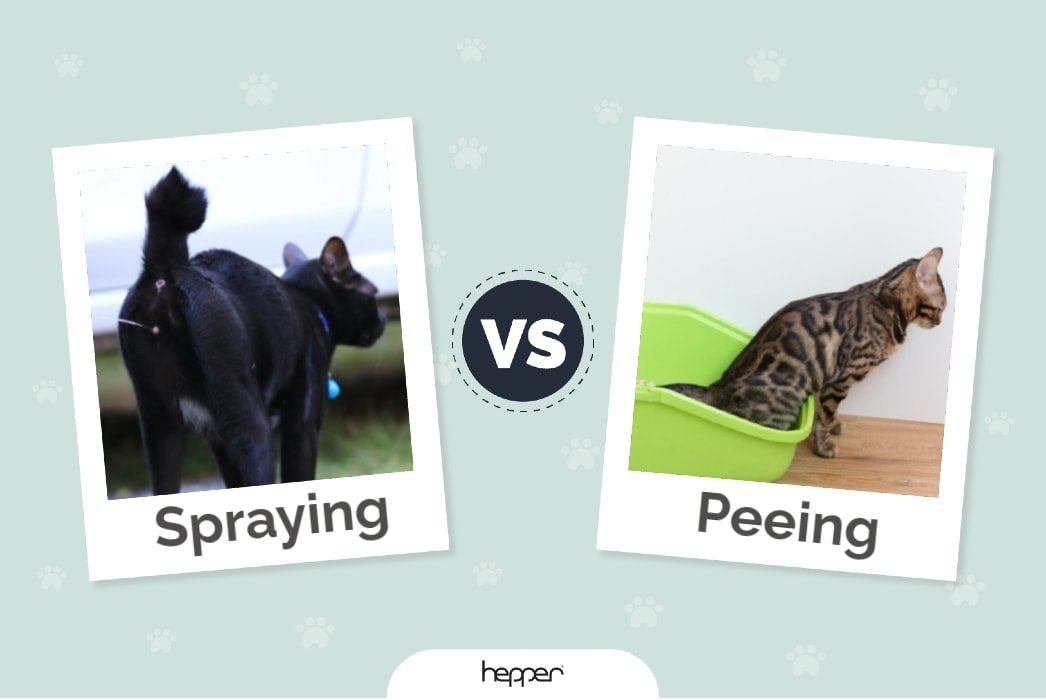
Click to Skip Ahead
Given this information, it makes sense that you’d want to prevent your cat from making urine messes in the first place. However, this can get complicated because you first need to know if your cat is spraying or just peeing in the wrong spots. In short, cat spraying is vertical urine marking to spread scent, whereas peeing is a low squat and large release of urine. Keep reading to learn more about how to tell the difference between these two behaviors and why it matters in terms of preventing them.
Overview of Cat Spraying
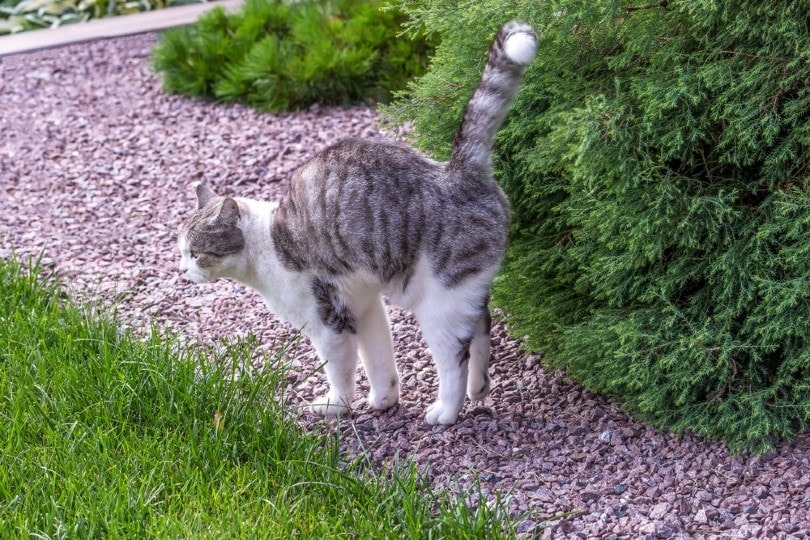
What Is Spraying?
Cat spraying, also called urine marking, is a normal, wild cat behavior that doesn’t translate well into indoor cat living. Scent is one of the primary ways that cats communicate among themselves, and spraying is one way they get their particular smell out into the world.
Cats usually spray onto vertical surfaces, like walls, furniture, and trees. The cat’s body position while spraying has a lot to do with this urine placement. When spraying, cats are usually standing with a raised tail. They often move their back feet, as if walking in place, and shake their tail as they spray.
Why Do Cats Spray?
Cats spray for several reasons, all related to an attempt to communicate with each other or their owners.
Marking their territory is one of the most common reasons that cats spray. Your cat may begin spraying if you move to a new house or bring a new cat into the family. While unpleasant to you, to your cat, spraying is necessary to make sure they claim their new space or clearly communicate which stuff is theirs to the new cat.
Indoor cats may begin spraying if an unfamiliar outdoor cat starts hanging around because they feel threatened. Intact cats spray to attract mates or scare off other potential suitors. Cats may also spray as a response to change or stress, whether it be a new baby or a new roommate.
Which Cats Spray?
Both male and female cats can spray, although unneutered male cats are the most likely to engage in this behavior. Spaying and neutering reduce but don’t eliminate the chances that your cat will spray. Spraying may be more likely to occur in households with more than one cat.
- Spraying is a way cats communicate with scent
- Cats spray standing up, onto vertical spaces like walls
- Cats spray to mark territory or if they feel threatened
- Cats spray to attract mates or if stressed
- Both male and female cats spray
- Intact cats are more likely to spray
Overview of Cat Peeing
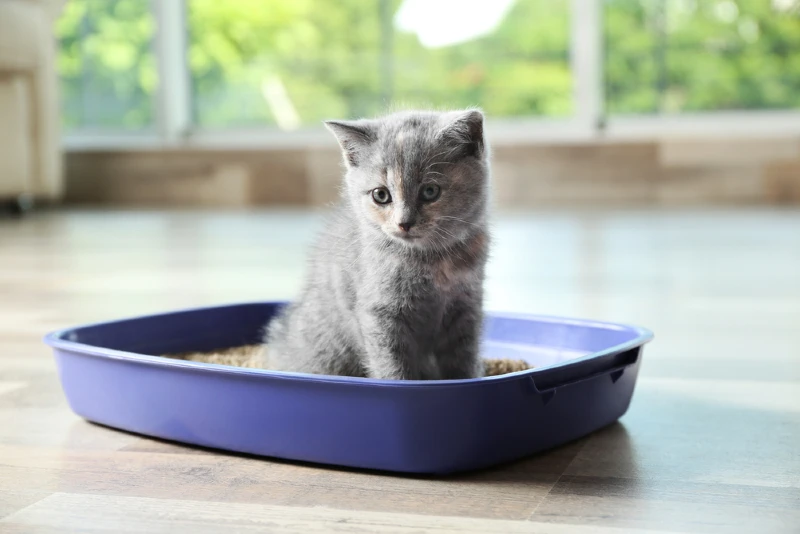
How Is Cat Peeing Different From Spraying?
When cats pee, they generally squat low and release urine onto the surface below them. Hopefully, this happens inside their litter box! Some cats naturally have a higher peeing stance than others but usually still make an effort to squat, unlike the upright posture a spraying cat adopts.
Cats may pee outside of their litter box for several reasons, which we’ll discuss in a minute, but they usually still pick a horizontal surface like a floor or countertop, unlike a spraying cat.
When Does Peeing Look Like Spraying?
Sometimes, you may think a cat is spraying because they are uncomfortable and unable to squat down to pee normally. This is common in older cats who develop arthritis or spinal pain. Cats with urinary or kidney infections may also adopt an abnormal posture when peeing due to pain.
So, Which Is It?
Unless you catch your cat in the act, you may need to rely on a process of elimination to determine if you’re dealing with spraying or inappropriate urination. Start with a complete checkup to eliminate any medical concerns that could be causing urinary issues. With medical issues ruled out, you can be more certain you’re dealing with a behavioral cause of some sort.
Another clue that your cat is spraying rather than just avoiding their litter box is whether they continue to poop in the right spot. Cats rarely marked with feces, while litter box avoiders will stay out of the box no matter what kind of deposit they need to make.
- Cats squat to pee rather than stand
- Cats pee on horizontal surfaces rather than vertical
- Cats in pain may pee in a more upright position
- Rule out medical problems first
- More likely to be spraying if the cat still poops in the litter box
How to Stop Your Cat From Spraying
Stopping your cat from spraying requires you to both thoroughly clean any areas where your cat sprays and diagnose why they’re displaying the behavior to begin with.
Cleaning is the easier job. Use a mild-smelling cleaner or one designed specifically to clean up cat urine, like an enzymatic spray. If your cat consistently returns to the same area to spray, you might need to cut off access to that spot temporarily.
Our favorite enzyme cleaner for eliminating pet smells and stains is our very own Hepper Advanced Bio-Enzyme Pet Stain & Odor Eliminator Spray. It makes clean-up a breeze because it permanently removes even the very worst smells and stains (urine, feces, vomit, you name it!) from basically any surface you can imagine.
- ADVANCED ENZYMATIC CLEANER - Penetrates the most stubborn smells and stains at the deepest molecular...
- FOR ANY MESS, ON ANY SURFACE - This pet odor eliminator cleans your carpets, floors, furniture,...
The 3 Tips to Stop Spraying in Specific Scenarios
1. If Your Cat Is Spraying to Attract Mates
In this particular scenario, it helps to get your cat spayed or neutered. While about 5% of female cats and 10% of male cats continue spraying after they’re fixed, it’s still one of the best ways to stop the unwanted urine marking in an attempt to lure a mate. However, if your cat has been spraying for other reasons, spraying may continue even after the procedure.
2. If You’re Dealing With “Sibling Rivalry”
In multi-cat households, spraying is often the result of both territorial marking and squabbling over resources like food, toys, or attention. Make sure your cats have their own space to sleep, eat, and use the bathroom. Keep one more litter box in the house than the number of cats in residence.
Make sure you give all your cats plenty of one-on-one attention so they don’t feel the need to fight for it. This might require you to separate your cats temporarily so they don’t intrude on each other’s play or snuggle time.
You can also use calming products like a pheromone spray or diffuser to help ease the kitty tension in your household.
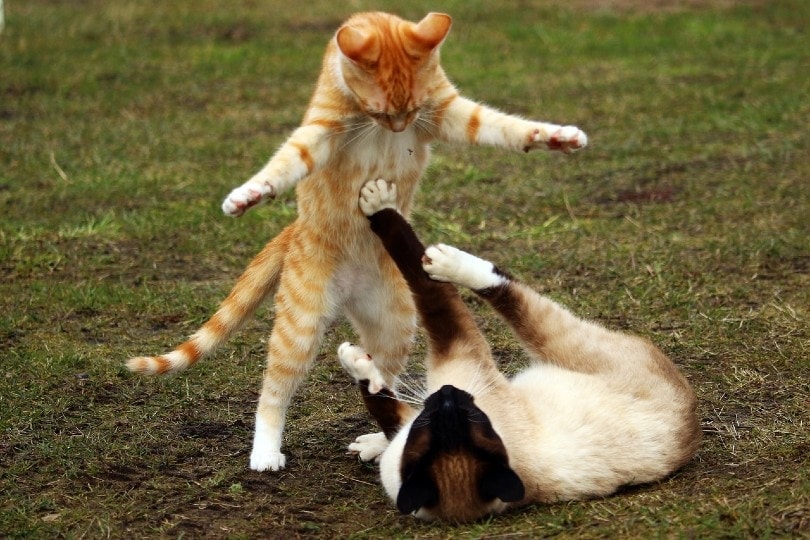
3. If Your Indoor Cat Feels Threatened by an Outdoor Intruder
Outdoor cats, stray or owned, can certainly be a source of stress for your cat and cause them to spray. A pheromone product may be helpful in this situation. You can also try to cover windows or doors to prevent your cat from seeing the outdoor cat.
You can also try to keep the outdoor cat away from your house by using physical deterrents. If you know who the cat belongs to, you may need to speak to their owner to try and work out a solution. Stray cats who make a nuisance of themselves can often be humanely trapped and relocated with the help of a local rescue group.
How to Stop Inappropriate Peeing
If medical issues are ruled out, inappropriate urination is often related to litter box trouble. Like with spraying, you’ll need to thoroughly clean any spots where your cat has urinated inappropriately to prevent your cat from re-soiling the area.
Preventing Litter Box Avoidance
Make sure you choose a litter box that’s large enough for your cat. Some owners like covered litter boxes because they help control odor, but not all cats will use them.
Unscented, clumping litter is usually recommended for best results. However, it’s most important to find a litter your cat likes and stick with it. Some cats are flexible, but many will refuse to use a new type or brand of litter with messy results.
Litter box placement is also key to preventing litter box avoidance. Cats want privacy but also not to feel trapped as they’re doing their business. Avoid placing the litter box in busy areas or tight corners. Noisy locations, like utility or laundry rooms, are usually less than ideal as well.
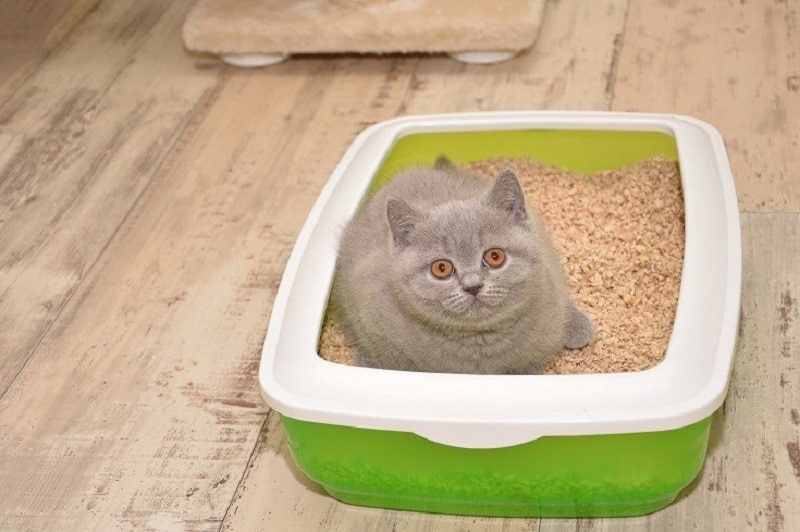
Dealing With Bully Cats
In some cases, your cat may have no problem with the litter box but still pee in inappropriate spots because another cat won’t let them use the box. Sometimes, you’ll need to temporarily separate the cats to determine if one or more is being a bully.
Again, this problem will require you to make sure you have enough litter boxes to go around and that they’re spread out in different locations. If you find you’re dealing with a consistently aggressive or jealous cat, you may need professional help from your vet or a veterinary behaviorist.
Conclusion
Dealing with cat urine all over the house is nobody’s idea of a good time, even for the most dedicated kitty lover. Discovering whether your cat is spraying or peeing inappropriately is the first step toward a cleaner house. Always remember to see your vet in order to rule out a medical issue first. Remember, your cat can’t tell you why they’re behaving the way they are, and spraying or peeing inappropriately is often the only cry for help they know how to make.
Related Reads:
- How Do Cats Mark Their Territory? 5 Common Ways Explained
- At What Age Do Male Cats Start Spraying? And What to Do About It
Featured Image Credit: Left: anlomaja, Shutterstock | Right: Dina-da, Shutterstock













